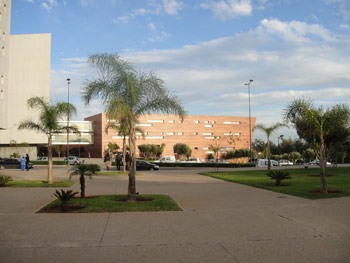Morocco Offshoring Sector: Interview with Morocco Largest Offshoring Parks Operator
Director General of MEDZ Sourcing, Abderrafie HANOUF
The Casablanca park is the most important park, and 5 other parks are being built in Fes, Oujda, Agadir, Marrakech. The area should reach a total of 700 000 m2.
Interview with Abderrafie Hanouf, Director General of MEDZ Sourcing

Can you give us a general idea of the MedZ group and its current situation?
MedZ Sourcing is a subsidiary of MedZ, which is a subsidiary itself of the CDG group (Caisse de Dépôt et de Gestion) – Morocco’s top investor. CDG accompanies the government and its policies. MedZ Sourcing is in charge of the offshoring sector, particularly conception, promotion and management of offshoring parks in Morocco.
Morocco aims to promote Moroccan businesses in the international market, particularly in Europe. What impact does this have on international businesses and what is Morocco’s strategy?
Globalisation has prompted the creation of big regional groups: Europe, America, South-East Asia and Mercosur countries form 4 main market places. Morocco is a link between Europe and Africa. It is also at the junction of several trade routes: to America, to the Middle East and to Asia. Morocco has grown aware of its strategic position, and signed several free trade agreements: with Europe, with the United States, Tunisia, Egypt, Jordan, Turkey.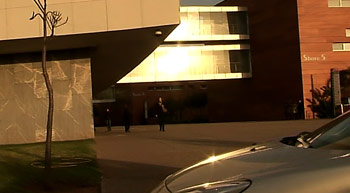
Morocco is now in the process of signing agreements with Canada and West African countries. We aim to become a trade hub, connected to 55 countries and about a billion consumers, as well as a regional hub for businesses wishing to settle in Morocco.
Morocco also aims to become a major player in the Mediterranean region, to increase its economic and political role in North Africa and the Middle East. This ambition was nurtured by its important history. Morocco aims to recover its former important position, by having a social, economic and political role in an ever-changing world.
Morocco was ranked 3rd best destination of continental Africa for investment in 2009-2010. What are Morocco’s advantages that should attract foreign investment?
“
The
Casablanca
park is the most important park, and 5 other parks are being built in Fes, Oujda, Agadir, Marrakech. The area should reach a total of 700 000 m2, and 6 billion dirhams should be invested by 2015-2016.
“
The business environment is favorable: a strong economy, a constant growth rate of 5-6% since 2005, developed infrastructure, telecommunication, rail network and roads. Important reforms during the ten past years have made the investment environment very favorable.
The government has launched various training programs, and Morocco now benefits from qualified human resources, yet, I believe, one of the cheapest in the region, the average salary being 1500-1600 dirhams.
All these elements make the environment extremely favorable. Numerous sector-based policies have been launched: the “Plan Émergence” aims to improve Moroccan standards in selected industries (electronics, automobile, aeronautics, offshoring) for international competitiveness; the ambitious “Plan Énergie” aims for Morocco to take 40% of its global energy from renewable sources by 2020; in the sector of agriculture, the “Green Plan” (Plan Maroc-Vert) aims to create a 100 billion GDP by 2020; in the field of tourism, after “Maroc 2010”, tourism made up 14% of the GDP, and “Vision 2020” aims to double this figure. All these sector-based policies aim to increase the GDP and create jobs, and create opportunities for foreign investment.
How would you define the offshoring sector?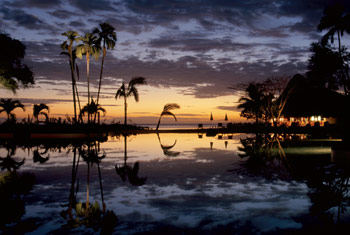
It is a mainstay of the government’s “Plan Émergence”, which plans on creating 100’000 jobs by 2015, and 20 billions of value-added. For us, offshoring is service outsourcing, in various sectors: computer and IT development, Business Process Outsourcing (BPO), Customer Relationship Management (CRM), and software design.
The offshoring sector has developed increasingly in the past few years: the world market is 100 billion dollars strong, and is expected to increase tenfold by 2020. Morocco wants to take part in that market, and Casa Near Shore is an important partner of the government regarding this policy. The Casablanca park is the most important park, and 5 other parks are being built in Fes, Oujda, Agadir, Marrakech. The area should reach a total of 700 000 m2, and 6 billion dirhams should be invested by 2015-2016.
Our network also attracts industrial businesses thanks to the Technopolis park, a technology park. It deals with sectors such as media but also highly specialized sectors such as microelectronics, biotechnology, nanotechnology. Last year it gained an international reputation by attracting 60 million euros of investment. The American firm Lear Electronics Intl built a car parts factory in the Rabat-Technopolis park. Groups like Mercedes and BMW are supplied by them.
What are Morocco’s challenges regarding foreign investment?
In the offshoring sector, experts define a destination according to 3 elements: 1) Business climate; 2) employment pool; 3) infrastructure and telecommunication standards. Morocco has put particular emphasis on the latter (6 billion dirhams were invested), and is now very competitive in the region, and among the 30 top world destinations today. Morocco aims to become a leading actor in the Mediterranean region, and be among the 10 top world destinations. Important effort has been made to create a highly qualified human resources pool. Morocco has now become a recognized offshoring destination.
We want all regions of the country to take part in this development. We analyze each region’s specific advantages, with a view to exploit the country’s global potential and help it develop economically and politically, according to the government’s policy. 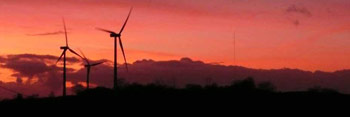
Human resources are a challenging element. Education has improved a lot during the past 5 years. We are encouraging people to learn languages, as we deal mostly with French and Spanish-speaking markets even though English-speaking markets are the most important markets in the offshoring sector. This can change thanks to languages. Another challenge is to stop salary inflation with a view to protect Moroccan competitiveness. The Ministry of Industry and the Ministry of National Education have taken important steps regarding these challenges.
Do Casa Near Shore and MedZ take part in dealing with these challenges?
The Ministry of Industry is the main actor of this policy, together with the AMDI, the Moroccan Agency for Investment Development. They form with MedZ a public-private partnership. Together we carry out a promotional campaign that targets Europe, the Americas and Asia. We attract investment in the aforementioned sectors and professions in which we are specialized, to Morocco. 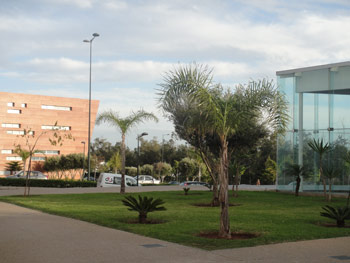
As for human resources, MedZ is in partnership with the Ministry of Industry and the Ministry of Education. Based on various surveys and studies, we have planned our efforts for the next 5 years according to the sector’s specific needs.
Can you tell us more about your promotional campaign that targets foreign markets?
We work together with the AMDI on different elements. We encourage foreign markets to consider Morocco as a possible destination through a media campaign, and by attending international trade fairs in Europe, Asia and the Americas. The AMDI is in charge of the media campaign, and we both attend fairs. After being considered, we want Morocco to be preferred: at this point we have a B2B approach. In 2011 we collaborated with about 10 businesses in France, Spain, UK, Switzerland. Businesses are also invited to visit our parks.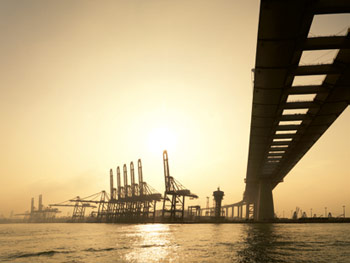
Can you give us concrete examples about what is being done in Fes, Oujda, Casablanca etc. to attract investment?
I mentioned the park in Casablanca specialized in computing and IT development. Rabat is known for its human resources pool, education and research. The Rabat Technopolis park includes an offshoring and industry area, a research area, and an academic area, in partnership with universities. In Fes, customer relationship management (CRM) and business process outsourcing (BPO) are very developed.
The government passed a law on personal data protection recognized by the EU that will help financial BPO develop in the next years. Marrakech is known for CRM and BPO but also industry and biotechnology, as universities in Marrakech work in these fields. In Agadir and Oujda, again, we will develop a mix of CRM and BPO. These two sectors will make up about 60-70% of the offshoring sector, whereas computing and IT development make up 30-40%.
What is your vision and your dream for your group in 5 years?
I have an ambition of a leading position in the Mediterranean for Moroccan offshoring. Our group will be working on this. I hope for the goal of creating 100’000 jobs in the sector by 2015 to be achieved. Morocco has its own ambitions too: it hopes to successfully carry out its sector-based policy, and for economic growth and GDP to jump.
Morocco hopes to become, by 2020, an economic leader in the region, a top partner of the European market, while being open to other areas of the world. It hopes to become a hub for development in the region, in collaboration with neighboring countries, with a view to create a more independent and developed trade area comparable to the European market, the American market and the Southeast Asian market.
What would you like to say to our readership?
I would like to say that Morocco is a welcoming country, full of opportunities. Morocco is like a big construction site, with a huge potential in sectors like industry and services; and an open construction site thanks to free competition and transparency. I want to invite international investors to come discover Morocco, and build its future together with us.